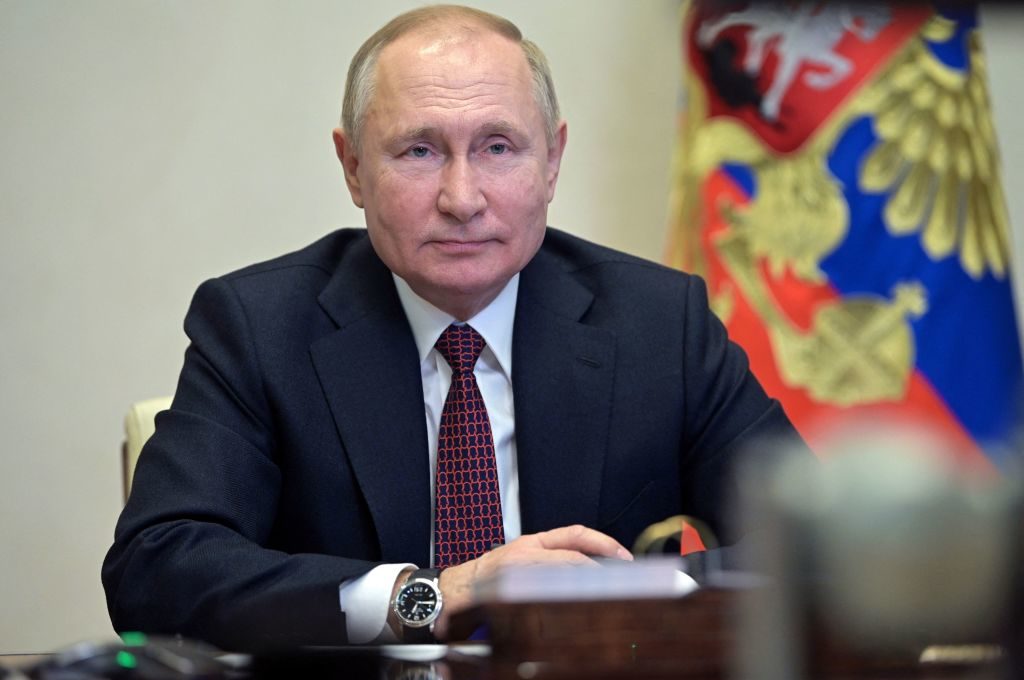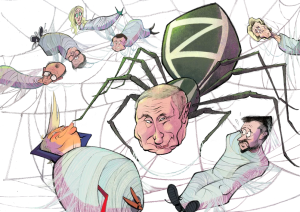The Ukraine crisis signaled to Western officials and pundits to once again begin recycling the historical analogy of the 1938 Munich Agreement, which handed Nazi Germany parts of Czechoslovakia in a failed bid to head off major conflict in Europe. This was expected. Such comparisons are usually followed by the predictable warnings about the danger of Western “appeasement.”
Hence British defense secretary Ben Wallace has recently compared Western diplomatic efforts to head off a Russian invasion of Ukraine to the appeasement of Nazi Germany ahead of World War Two, suggesting that unnamed Western countries were not being tough enough with Moscow.
“It may be that (Russian president Vladimir Putin) just switches off his tanks and we all go home but there is a whiff of Munich in the air from some in the West,” he said.
“This smells like Munich 1938,” asserted Marko Mihkelson, chairman of the foreign relations committee of the Estonian parliament. “The one who is threatening us and has turned guns against us is being calmed down,” he asserted, promoting a comparison between Putin and Nazi Germany’s Adolf Hitler and in the process cautioning US president Joe Biden and other Western leaders not to be “like” Neville Chamberlain, who permitted the German annexation of Czechoslovakia’s Sudetenland.
;768:[300×250,336×280,320×100];0:[300×250,320×100,320×50]”]That a new film titled Munich,”a British-German co-production, based on a novel by British author Robert Harris, is playing now in movie theaters worldwide and streaming online — not to mention the fact that the Ukraine crisis was dominating the discussions in a major security conference taking place in, well, Munich — provide more opportunity to basically forewarn us that if you seek a replay of World War Two, then do make a deal with Putin.
On one level, the 1938 conference that pitted the leaders of two democracies, Britain and France, against two dictators, Hitler and Italy’s Benito Mussolini, does provide us with an important lesson: we in the West do want our elected national leaders to embrace a tough stand during negotiations with representatives of dictatorships and authoritarian regimes. Duh!
And that certainly applies to the current negotiations with the Russian arch-nationalist Putin, who is responsible for provoking the latest crisis and who certainly does not remind us of the kind of liberal metrosexual types that represent Western democracies these days, like France’s Emmanuel Macron, Canada’s Justin Trudeau or US secretary of state Antony Blinken, who remind us of the nice and nerdy guys who would lose every fight with the bullies in high school.
But then comparing the 2022 international negotiations over Ukraine to the 1938 talks over Czechoslovakia runs contrary to any basic reading of what occurred in Munich when Hitler, representing the most powerful military force in world history since the Roman Empire, was facing representatives of countries who were not ready to go to war with him at that time.
So vive la différence: the United States is actually now the greatest military power in world history since the Roman Empire and the leading global economy, and Russia, with a GDP the size of Italy, lost a long time ago the status of “superpower.” Without its oil reserves and nuclear weapons, Russia would be relegated to the rank of a mid-size power like Brazil.
;768:[300×250,336×280,320×100];0:[300×250,320×100,320×50]”]But the main resistance to employing the Munich analogy has less to do with the ahistorical nature of the comparison to the crisis in Ukraine, but to a more important lesson of history: embracing “Munich” has led some post-World War Two Western leaders on the road to diplomatic and military catastrophes.
Anthony Eden, who had served as foreign secretary to Winston Churchill during World War Two and later succeeded him as British prime minister, was probably the first Western leader to do the “Munich” thing to justify going to war in 1956 against Egypt under Gamal Abdel Nasser—whom he compared to, you know, Hitler. (It should be noted that the Soviets compared almost every Western leader to Hitler).
The 1956 Suez Campaign ended up as a diplomatic catastrophe for the Brits. And to recall: Israel ended up defeating the heir to Nazi Germany in six days in 1967.
Google “Vietnam War” and go over the addresses American political and military leaders made and the columns American pundits wrote to justify the costly intervention in Vietnam, and you are likely to find references to Munich and the repeated argument that any concession to North Vietnam’s Ho Chi Min would amount to the kind of “appeasement” demonstrated by the West in 1938.
More recently, Munich, Hitler and appeasement featured as the central themes in the calls for war against Iraq’s Saddam Hussein made by American and British leaders twenty years ago, leading to the worst military fiasco in American history and another Suez-like blow to Britain. That the current British foreign minister applies that analogy against the backdrop of the Ukraine crisis is a bit ironic.
The point is not that Western leaders should not have demonstrated resilience in dealing with Nasser, Ho Chi Minh, Saddam or Cuba’s Fidel Castro, another favorite Cold War bogeyman, or for that matter with Iran’s ayatollahs today. But not every military and diplomatic concession to a bad guy is equivalent to appeasement.
;768:[300×250,336×280,320×100];0:[300×250,320×100,320×50]”]Indeed, one of common episode of alternative history that derives from the Munich analogy is that if Chamberlain had not made concessions to Hitler, the Nazi dictator would have recognized that there were limits to his ability to extend German power in Europe, and World War Two would not have happened.
But as suggested by the novel and film Munich (spoiler alert!), Chamberlain assumed that he was doing business with a realpolitik German nationalist leader who was seeking to preserve a German sphere of influence in Europe. He and the other Western leaders were not aware of Hitler’s long-term plans to extend German power into Russia and Eastern Europe, to establish lebensraum for the settlement of millions of Germans who would use the Slavic people as slave labor and of course to murder the Jews there. A deal with Hitler, as Soviet dictator Joseph Stalin would discover, was not a workable proposition.
Or to put it another way, if Germany in 1938 has been ruled by a realpolitik nationalist like Otto von Bismarck, allowing the Germans to annex the Sudetenland might in fact have provided a basis for reconciling German and Western strategic interests.
In fact, in a way the West ended up doing a Munich during the 1945 Yalta Conference, when Europe was divided into spheres of influence and the American and the British abandoned the Poles, Hungarians and Czechs to live under Soviet rule for more than forty years.
But the balance of power in Europe had remained stable, and no hot war took place in the continent all those years. Stalin may have been a brutal dictator like Hitler, but he and his successors in the Kremlin remained faithful to their realpolitik agenda of peaceful co-existence with the West more than to their ideological fantasy of imposing communism on the Western nations.
Should we accuse Churchill and the Franklin Roosevelt of practicing appeasement in Yalta, or conclude that they had recognized that going to war with the Soviet Union in 1945 to defend Poland may have been the right thing to do but was a very costly proposition that the American people would not be willing to accept?
But then, you do not have to substitute Ukraine for Poland but consider instead the agreement on Austria’s neutrality that the West reached with the Soviets in 1955, ten years after Yalta, turning that Alpine country, as Dr. Henry Kissinger put it, into a “bridge” between the two sides, and ensuring peaceful co-existence between Moscow and the West.
;768:[300×250,336×280,320×100];0:[300×250,320×100,320×50]”]
























